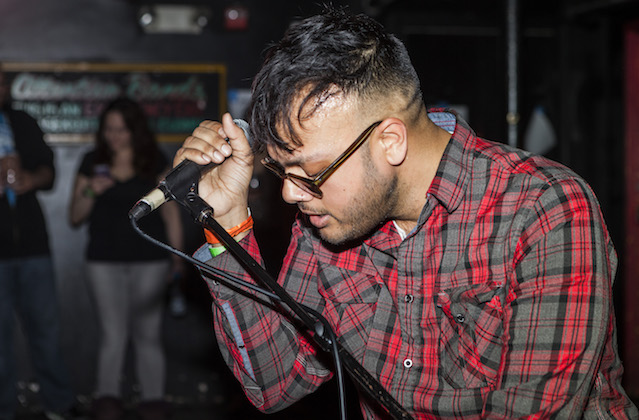In response to Donald Trump‘s election, Philadelphia-based rapper and producer Lushlife brought a diverse group of MCs, poets and writers together for an ambitious mixtape that translates contemporary political anxieties into a full-blast attack on American oppression.
The South Asian-American MC, whose government papers read "Raj Haldar," created "My Idols are Dead and My Enemies are in Power" (sic) over a 10-week period after the election of Trump. Instrumentals throughout the mixtape’s 14 tracks shift in mood from solemn to bombastic. Those beats ground powerful verses and spoken-word passages from Lushlife and 19 co-conspirators, including Killer Mike and Kool A.D., authors Porochista Khakpour and Nikesh Shukla and scholars Jedediah Purdy and Sut Jhally. Their excoriations of mass incarceration, Islamophobic foreign policy, Reaganomics and the new president weave into a cohesive call to fight the racist structures that enabled Trump’s rise.
According the Lushlife, all proceeds from "My Idols are Dead and My Enemies are in Power" will benefit the American Civil Liberties Union (ACLU), which reported over $24 million in donations immediately following Trump’s executive order on immigration. (The mixtape dropped on January 17, before the dramatic spike in contributions.) We caught up with Lushlife about the new mixtape’s confrontational message, supporting the newly enriched ACLU and artists’ responsibility in Trump’s America.
Many artists are reacting to this political moment but not with full releases inspired by it. What compelled you to create this mixtape?
Like a lot of other folks, I was left stunned in the wake of the election. More than anything, it felt like a rude awakening to the very real divisions of class and race in this country, amplified by the information silos and echo chambers created by mainstream news and social media. After a brief period of post-election mourning, I turned to music to unpack my feelings, just like I’ve always done. But this time around, it felt more important than ever to involve a diverse array of voices from across disciplines to create a project that could cross-pollinate ideas and stoke discussion between segments of our communities that don’t usually hear each other’s voices. From that driving principle, the idea for an interdisciplinary mixtape that included insights from artists, authors, academics, and poets was born.
Describe some of the album’s lyrics, which tackle racism and social justice across several issues.
On "This Ecstatic Cult (Zilla Rocca Remix)," Killer Mike, Kool A.D. and I take on the prison-industrial complex. I directly call out the Clintons, whose policies throughout the ‘90s left many tens of thousands of Black and Brown men incarcerated in its wake. I saw too many liberals catastrophizing a Trump presidency post-election, and I felt like it was important to remind listeners, throughout the mixtape, the fact that American politics prior to this election cycle have been far from a walk in the park.
"The Heart Is An Atomic Bomb" takes on the birth of suicide bombing in the latter part of the 20th century as a direct response to American intervention in the Middle East. Iranian-American author Porochista Khakpour recounts a childhood memory of seeing an anti-Khomeini and anti-American-imperialism protester self-immolate in front of the Los Angeles Federal Building. Billy Woods then spits 16 bars from the perspective of a current-day mass-shooter, describing how easy it is to become radicalized. It’s intense shit, but I really believe that these are the kinds of voices that Americans need to hear in the face of a zeitgeist of normalizing racism and xenophobia.
Why did you choose to donate album proceeds to the ACLU?
Exactly because "Idols and Enemies" contributors come from very deeply diverse backgrounds, we felt the need to support an organization like the ACLU, whose full breadth of directives could be agreed upon by all the artists, activists and academics involved in the project. The ACLU has spent close to 100 years defending the basic civil rights of all Americans, and I believe that they will be one of our strongest allies in the face of an incoming administration that has promised to curtail our constitutional rights.
This mixtape is more overtly political than your previous releases. Do you think artists have a responsibility to address this socio-political climate?
As a person of color, I’ve always thought of the mere action of writing and releasing music within a broader cultural context that willfully boxes me into certain stereotypes as a small-but-significant political act. That said, "Idols and Enemies" represents my first full-length project engaging directly and fully in a capacity of political resistance. In a moment where dismantling the National Endowment for the Arts and privatizing PBS and NPR have become open threats, I can’t see how any artist can stand by while our already-scant support structures lie in the balance.
"My Idols are Dead and My Enemies are in Power" is available now. Visit the mixtape’s website to purchase.
